Helen Okechukwu
As Africa grapples with the relentless onslaught of Antimicrobial Resistance (AMR), the continent’s healthcare landscape is undergoing a profound transformation driven by innovative e-learning platforms. AMR, a silent killer often overlooked by many, poses a significant threat to global health, with Africa facing unique challenges in combating this growing pandemic.
In the heart of Africa, the grim statistics paint a stark reality: millions are affected, and thousands lose their lives each year to antibiotic-resistant infections. AMR occurs when microorganisms overpower the drugs designed to combat them, leading to dire consequences for human and animal health alike. According to recent studies by the World Health Organization (WHO), without decisive action, Africa could see 4.1 million lives lost by 2050 due to AMR, making it one of the top 10 global public health threats.
In 2019, AMR has been directly responsible for the loss of 4.95 million lives due to the rapid rise of antimicrobial resistance in human life.
The economic toll of AMR in Africa is staggering, with developing countries facing potential losses of up to 5% of their GDP. The repercussions could surpass those of the 2008 financial crisis, underscoring the urgent need for concerted efforts to combat AMR effectively. One of the leading causes of AMR is the misuse of antibiotic drugs, compounded by factors such as the lack of enforcement of prescriptions and selling regulations.
Sub-Saharan Africa bears the brunt of AMR’s deadly impact, with the highest death rate recorded both on the continent and globally,with records of over 99 deaths per 100,000 people. Overuse of antibiotics further exacerbates the problem, leading to the emergence of drug-resistant pathogens that claim hundreds of thousands of lives annually. The misuse of antibiotics in human and animal feed adds another layer to the complex web of factors driving AMR in the African region.
Addressing the AMR crisis requires a diverse approach, encompassing regulatory reforms, public awareness campaigns, and investment in healthcare infrastructure. E-learning platforms are emerging as a powerful tool in equipping healthcare professionals with the knowledge and skills needed to combat AMR effectively. By harnessing the transformative potential of technology, Africa is forging ahead in the fight against AMR, determined to safeguard the health and well-being of its people for generations to come.
The survivor is now an advocate.
Venessa Carter, a 45-year-old South African native, stands as a testament to the profound impact of Antimicrobial Resistance (AMR) on individual lives. Her journey through the treacherous terrain of AMR began with a seemingly routine infection that rapidly escalated into a life-threatening ordeal. Despite multiple treatment attempts, the bacteria proved resilient, resisting the antibiotics meant to combat them and posing a grave risk to Venessa’s survival. In the face of such adversity, she emerged as a fierce advocate for AMR awareness, determined to prevent others from enduring a similar fate.
At 25, Venessa’s life took a dramatic turn when she became involved in a car accident that left her battling not only physical injuries but also the insidious threat of AMR. As she recounted her story to Metro, Venessa described the frustration and fear she experienced as her antibiotics ceased to be effective against the relentless onslaught of resistant bacteria. Despite the challenges, she refused to succumb to despair, instead channeling her energy into raising awareness and advocating for greater vigilance in combating AMR.
Seeking specialized medical care, Venessa underwent a series of surgeries to address the damage inflicted upon her face by the accident and the subsequent complications caused by AMR. Each procedure was a testament to her resilience and determination to overcome the obstacles in her path. However, the road to recovery was fraught with setbacks, as Venessa discovered that her body’s immune system was actively resisting the medication intended to combat the infection, leading to further complications in her eye socket.
Undeterred by the challenges she faced, Venessa pressed on, undergoing additional surgeries in 2021 to repair the lingering damage caused by AMR. Supported by a regimen of various antibiotic drugs, she gradually regained her health and strength, emerging from the ordeal with a renewed sense of purpose. Through her advocacy work and public outreach efforts, Venessa continues to educate others about the dangers of AMR and the importance of responsible antibiotic use.
In a world where antimicrobial resistance poses an ever-increasing threat to public health, Venessa’s story serves as a poignant reminder of the resilience of the human spirit and the power of advocacy in effecting positive change. Her journey from survivor to advocate underscores the urgent need for collective action to combat AMR and safeguard the health and well-being of future generations.
At the forefront of this movement stands Oazis Health, led by Dr. Eric Mugabo, co-founder of Oazis, a pioneering NGO and a visionary public health expert. Through cutting-edge e-learning platforms, Oazis Health is empowering healthcare professionals across Africa with the tools and knowledge needed to combat AMR effectively. From seasoned physicians to frontline workers, beneficiaries of Oazis Health’s programmes are being equipped with the critical insights and skills necessary to tackle AMR in their communities.
Likewise, like other deadly killers, AMR is a silent killer and a threat to human existence. Studies have shown that 1 in 5 children under the age of 5 and the elderly are most acutely affected, with 45% in West Sub-Saharan Africa, 20% in Sub-Saharan Africa, more than 10% in Central Africa, and more than 5% in South Saharan Africa in 2019.
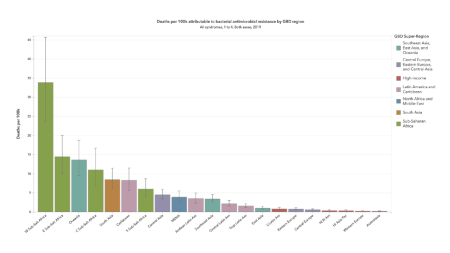
Data obtained from Institute for Health Metric and Evaluation
It was that prospect that spurred Dr. Eric Mugabo and other health professionals to come together to raise awareness of AMR using an innovative approach aligned with WHO, especially in underserved and hard-to-reach communities.
Oazis Health Initiative is a youth-led, Rwandan-based grassroots organisation that employs cost-effective and innovative digital health solutions to make sure that everyone has access to good-quality health care. It’s focus is on combating AMR in Africa, using an innovative approach, community engagement, and campaigning on the matter of combating AMR in public and private health care in Africa.

Data Review of Oazis Health Progression since her Inception in June, 2023; Data is obtained from Oazis Health Website.
It’s starting its operations in Kigali, Rwanda, and East Central Africa on the African continent. In its first six months, the e-learning platform has obtained 3700 active registered users, with collaboration from the Ministry of Health in Rwanda, Nigeria, and Uganda.
But the fight to tackle AMR in Africa continues as it poses a threat to human life.In the heart of Rwanda, amidst the sprawling savannahs and bustling cities, healthcare heroes like Nurse Ammiel Gasarabwe are putting their newfound knowledge into action after completing. Having completed stewardship courses on Oazis Health’s e-learning platform, Nurse Gasarabwe is spearheading educational initiatives at Busanza Health Centre, raising awareness and educating his co-nurses and community on how to mitigate the spread of AMR. Through peer-to-peer lectures and interactive sessions, Nurse Gasarabwe is instilling vital lessons on proper sanitation, responsible medication usage, and adherence to doctors’ prescriptions, empowering individuals to take control of their health and combat AMR at its source.
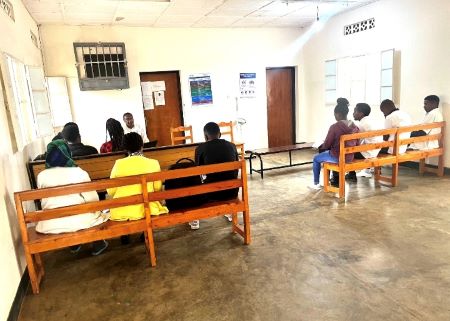
Ammiel Gasarabwe, a beneficiary of Oazis Health e-learning plaform, a nurse, carrying out an educative session at Busanza health center, one of the healthcare center in Rwanda, PC: Oazis Health.
Another beneficiary of the e-learning platform of Oazis Health, Phabian Mbabia,had been excited since it started, despite the fact that he was not a science student. He was gripped with excitement about the knowledge he got from the course provided by the Oazis Health e-learning platform.
“Good day, Oazis Health. I am so happy to partake in this course. Thank you for bringing such an important and educational course to us on a platter of gold. I am not a science student, but this course expanded my knowledge of some important scientific terms. It taught a lot about human health and AMR. It was well worth my time, and I am grateful. Thank you.”
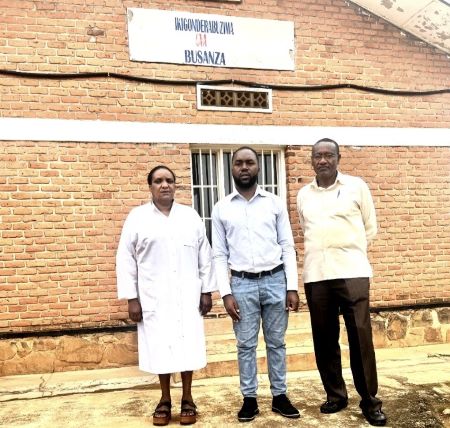
Co-nurse on the Flag Left, Middle, Dr Eric…. Oazis Health Personel attended the session of one the benefiary, Nurse Ammiel Gasarabwe at the flag Right, PC: Oazis Health.
Meanwhile, testimonials from beneficiaries like Marian Oparah from UNN in Nigeria underscore the transformative impact of Oazis Health’s e-learning platform. With newfound knowledge and insights gained from the course, individuals like Marian are poised to become ambassadors for change in their communities, advocating for the importance of protecting our health and combating the threat of AMR.
“It’s been a long ride, and it was worth every step. Thank you for this value-packed course. I found it interesting and helpful to me. I will educate those around me of the need to protect our health.“
“I’m now ready to start up the research and innovation mentorship on AMR,” says Samuel Bright, an e-user of the innovative platform.
Simeion Evan, a steward, was also charged with using his new-found knowledge to improve his skills in fighting AMR after enrolling in the e-learning platform of Oazis Health.
“I am glad I completed this course. I learned a lot about antimicrobial resistance and antimicrobial stewardship. I have improved my skills in the area. I want to congratulate other health care professionals who enrolled in this course and finished.”

Denyse UMUGWANEZA, Health Specialist at Rwanda Biomedical Center (RBC), delegated by the RBC to attend the launch of the education platform, PC: Oazis Health
But the road ahead is fraught with challenges. Limited access to infrastructure, including computers and the internet, poses significant barriers to widespread adoption of e-learning platforms in Africa. To address this issue, Oazis Health is working tirelessly to make its platform accessible offline, ensuring that even those in remote areas can benefit from valuable educational resources.
“People who complain that they don’t have internet at home—we know this is real because Africa still has a long way to go about infrastructure, such as computers and internet, so that the platform can be available everywhere. That’s why we are working intensively to make the platform available offline for people who have limited access to the internet, using campaigns.“
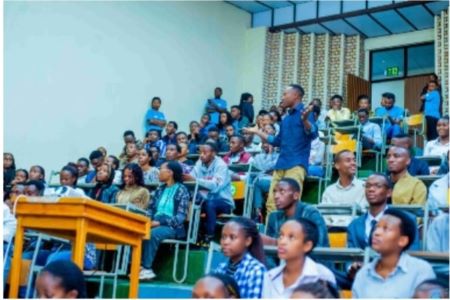
Oazis Health engaging in educating young community on the importance of tackling the silent killer, AMR. PC: Oazis Health
To reach the community, Oazis Health identified and reached out to significant community representatives within the communities, health workers, and government ministries like the Ministry of Health in Rwanda to create awareness about the risk of AMR in human lives.
“We engage with local communities and raise awareness among them about antimicrobial resistance because they are the key prayers in containing AMR.“ Says the Oazis representative.
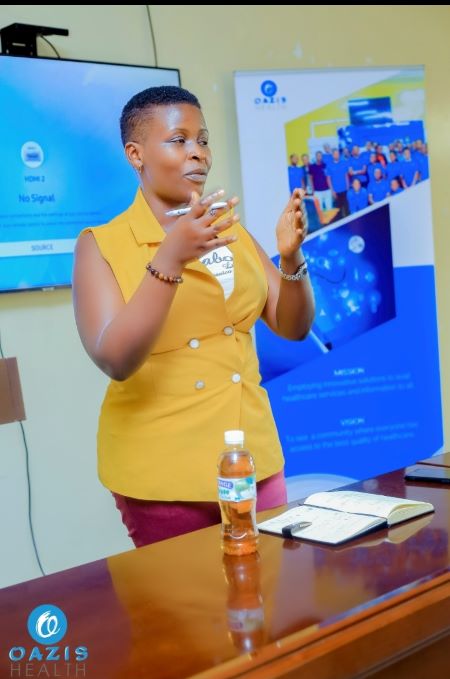
Denyse UMUGWANEZA, One Health Specialist at Rwanda Biomedical Center (RBC), PC: Oazis Health
Through strategic collaborations with local communities, healthcare workers, and government ministries, Oazis Health is driving a grassroots movement to combat AMR across Africa. By raising awareness, disseminating knowledge, and empowering individuals with the tools they need to protect their health, Oazis Health is paving the way for a future where AMR is no longer a looming threat but a conquered foe.
But the battle against AMR extends far beyond hospital walls. Governments across Africa are ramping up their efforts to combat this silent pandemic, investing in healthcare infrastructure, capacity building, and research using the “one health approach.” From stringent antibiotic stewardship policies to strategic partnerships with local stakeholders, African governments are leading the charge against AMR, determined to safeguard the health and wellbeing of their citizens.
The reporter’s journey led her to Benny Affordcare Walk-in Clinic, where she met Dr. Joseph Elimimian, a dedicated resident surgeon doctor. In the bustling corridors of the clinic, Dr. Joseph’s presence was unmistakable—a surgeon and health expert with a mission.
With a keen eye for detail and a deep commitment to patient care, he navigates through the complex web of medical records and treatment protocols.
“Every prescription tells a story,” Dr. Joseph muses, his voice carrying the weight of years of experience. “It’s not just about treating symptoms; it’s about understanding the intricate dance between medication and the human body.”
In this world of white coats and stethoscopes, meticulous record-keeping is paramount in a teaching hospital where he also works. Each patient is assigned a unique identifier, ensuring that their medical history is carefully documented and accessible at a moment’s notice. For Dr. Joseph, this level of accountability is non-negotiable—it’s the foundation upon which effective healthcare rests.
Dr. Joseph Elimimian in his office, PC: Helen Okechukwu
“One patient, one prescription,” Dr. Joseph reflects, his brow furrowing with concern. “It sounds simple enough, but the consequences of misuse are staggering.”
He recalls a particularly harrowing case from the emergency department—a patient whose initial response to antibiotics was promising, only to spiral into a state of critical illness. It was a wake-up call, a stark reminder of the dangers posed by AMR.
“As healthcare providers, we wield tremendous power,” Dr. Eric, his voice tinged with solemnity. “But with that power comes responsibility—the responsibility to prescribe judiciously, to monitor cases of resistance, and to educate our patients about the importance of antibiotic stewardship.”
As the sun sets over the sprawling savannah, Africa’s fight against AMR enters a new chapter—one defined by innovation, resilience, and unwavering resolve. Through the collective efforts of NGOs, healthcare professionals, government leaders, and survivors like Venessa Cartha, Africa is paving the way for a future where AMR is no longer a looming threat but a conquered foe.




We’re making great strides!!
These antimicrobial resistant parasites, how were they contacted? That Africa is worse hit is not new, but what concerted effort has the WHO done to practically assist in the direction of resolving the problem